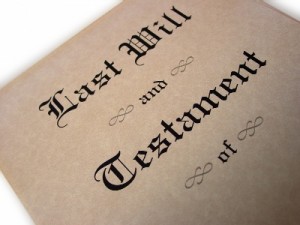
You can leave a legacy to St. Paul’s Episcopal Church by making a deferred gift. A deferred gift is one put in motion today, but you defer the parish’s receipt and use of the gift to a later time. There are two types of deferred gifts.
Revocable deferred gifts are those made today but over which you retain the power to change your mind. Irrevocable deferred gifts are those where St. Paul’s Parish’s gift is final but its enjoyment of the gift is temporarily deferred. Often you will retain some rights in an irrevocable deferred gift.
Irrevocable deferred gifts are relatively complicated due to the requirements of the Internal Revenue Code, but the complexity should not discourage you from making them. Often they can provide substantial benefits to you and your family while also benefiting St. Paul’s Parish. You should discuss irrevocable gifts and their ramifications with your attorney or tax professional.
Here we will focus on how to make revocable deferred gifts to St. Paul’s Parish.
Bequests
You may wish to make a substantial gift to St. Paul’s Parish, but feel that you are not in a position to do so during your lifetime. If this is the case, you can make a bequest to parish in your will. The property described on the Endowment page as appropriate for outright gifts to the parish may also be appropriate for a bequest.
You may make a bequest to St. Paul’s Episcopal Church in several different ways.
1. A specific bequest is a gift of a stated amount of cash or specific assets:
I give and bequeath the sum of $__________ to St. Paul’s Episcopal Church, Medina, Ohio, for its general purposes.
I give and devise to St. Paul’s Episcopal Church, Medina, Ohio, for its general purposes all right, title and interest owned by me at the time of my death in the land and buildings situated at ______________________.
2. A residuary bequest is a gift of all or part of the property remaining in your estate after taking care of your family and paying all debts, taxes, and expenses of your estate:
I give, devise and bequeath to St. Paul’s Episcopal Church, Medina, Ohio, for its general purposes all the rest, residue and remainder of my estate.
3. A contingent bequest is a gift that takes effect only if a named beneficiary fails to survive you. This insures that your gift will be used to further St. Paul’s ministries instead of passing to distant relatives or the state under the laws of intestacy.
If neither my husband nor any descendant of mine survives me, the I give, devise and bequeath all the rest, residue and remainder of my estate to St. Paul’s Episcopal Church, Medina, Ohio, for its general purposes.
4. A split-interest bequest is a gift shared by the parish and family members. It will take the same form as the irrevocable deferred gifts described above.

Your estate may deduct the full fair market value of a bequest to St. Paul’s Parish against Federal estate tax without limitation. This savings in estate taxes will have the effect of reducing the cost of your gift to the church. If upon your death you would otherwise owe $50,000 in estate tax, you could make a bequest to St. Paul’s Episcopal Church without reducing the assets that will pass to your family. Instead it would reduce the amount passing to the government in tax.
Qualified Retirement Benefits
Pension plans, profit sharing plans, stock bonus plans, 401(k)s, Keogh plans, HR 10 plans, and IRAs are sometimes generically called “qualified retirement benefits.” These plans are tax exempt so long as the assets remain in the plan. They require distributions after a certain date and in a certain amount. These distributions are subject to income tax. Any distributions above the stated amount are subject to a penalty tax. At death, any excess balance in the plan will be subject to income tax and, unless it passes to a spouse, could also be subject to penalty tax and estate tax. The combined tax on the excess balance can approach 90%.
Qualified retirement benefits therefore may be the ideal deferred gift to St. Paul’s Parish. You could name the church as the beneficiary of the plan upon your death. You can retain the right to change the designation at any time. You will not be entitled to a current income tax deduction, but your estate will be entitled to an estate and income tax deduction to offset the value of the plan. As a result the excess balance in the plan can be used to support the church’s ministries undiminished by tax.
Life Insurance
If you own life insurance that you no longer need for the protection of your family or other purposes, you may use it to make a deferred gift to St. Paul’s Parish. You can name the congregation as the beneficiary of the policy. Like qualified retirement benefits, you will not be entitled to a current income tax deduction. Upon your death, however, the insurance proceeds will be paid to St. Paul’s Episcopal Church undiminished by tax.
Consult Your Tax & Estate Planning Specialists
Please note, the restrictions on values of gifts and percentages of income quoted above are from the federal Internal Revenue Code. Further, the specific language required by law for bequests or for the transfer of assets varies from state to state and laws governing estate planning change from time to time. U.S. laws are always subject to change and amendment. Therefore, the restrictions quoted or testamentary language suggested in this article are illustrative only, and in no way constitute legal or tax advice. You should always consult with your attorney, tax adviser, accountant, or other licensed specialist before making any sizable donation to charity.
If you would like to make a deferred gift to St. Paul’s Episcopal Church or to the parish’s Searles Endowment, please have your estate planning professional call the Rector at 330.725.4131.